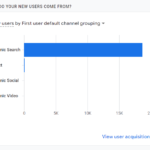When comparing Google Analytics and Wix Analytics, it’s important to understand the strengths and limitations that each platform offers. That way, we can determine which analytics matter most for specific needs. Both of these tools offer very valuable insights into website performance, but at the same time they cater to different audiences and requirements.
Let’s take a look at their features, benefits, and also the key metrics that really matter.
What does Wix Analytics offer?
Wix offers a user-friendly analytics dashboard that is built in to your website.
Let’s look at some of the key features:
- Traffic Overview – Wix Analytics gives you information about visitors to your site, page views and traffic sources. It can also tell you if they visited from your social media.
- Visitor Behaviour – You will see which pages are most popular, the length of time visitors stay on your site, and which buttons or links they click
- Sales and Conversion Tracking – For any eCommerce site, Wix Analytics can help to track sales data, including revenue, conversion rates, and also abandoned carts.
- User Demographics – You can see whether your visitors are using mobile devices or desktops and also which country they are accessing your site from.
Analytics within Wix have improved a lot over the last couple of years and continue to create new features making it a valuable rival for Google Analytics for businesses on the Wix platform.
What does Google Analytics offer?
Historically Google Analytics has been a very comprehensive tool that has been able to provide a much wider range of data as well as customisable options. However, for some users it can be overwhelming, with too many features.
This is what Google analytics has to offer:
- In-Depth Reporting – Google Analytics offers reports that are more detailed, these include information such as user demographics, device type, interests, and geographic location. It is also possible to create custom events and set up goals that measure any specific action that takes place on your website (e.g. a button click).
- Advanced Segmentation – Google Analytics makes it possible for you to create custom segments that can analyse specific groups of users, for example those who came from social media, through organic search, or via a particular campaign.
- Integration with Other Tools – Google Analytics can be integrated with other tools such as Google Ads, Search Console, and other Google services. This offers you a better picture of your marketing efforts across all channels.
- Custom Reports and Dashboards – Google Analytics allows you to build custom reports and dashboards that can be tailored to your specific needs. It offers deep insights into the behaviour of your users and also the performance of any campaigns you run.
Ease of use
Whilst Google Analytics offers a good range of advanced features, this also makes it a little more confusing for beginners. Setting up tracking codes, configuring your goals, and interpreting data is something of a steep learning curve. The flexibility and depth that it offers does, however, make it a popular choice amongst more experienced users. It is also platform agnostic so you can use it whatever the platform that has been used to build your website including Wix, WordPress, React etc.
Wix Analytics, on the other hand, has been designed with simplicity in mind and this makes it very accessible to those users who have little to no technical expertise. Wix websites have built-in integration that removes the need for any additional setup, and it also has an intuitive dashboard that offers clear insights to users at a glance. Of course, you have to have a Wix website to take advantage of this integration, and that in itself will bring limitations to the functionality and design you can create.
My best advice is to choose the platform that best suits the requirements and aspirations for your website.
Integration and compatibility
It is possible to integrate Google analytics with a number of platforms and tools, these include:
- Google Ads – for performance and tracking
- Google Search Console – for SEO insights
- Third-party tools – such as CRM systems and email marketing platforms
Wix analytics, however, is bound tightly to the Wix platform. This ensures there is seamless functionality for users. It also allows for the support of basic integrations via tools such as Google Ads and Facebook Pixel. But, its compatibility is more limited in comparison to Google Analytics.
Customisation and scalability
Google Analytics has plenty of customisable options, this allows users to:
- Set up a range of custom events and goals
- Create advanced segments in order to analyse specific user groups
- Build personalised dashboards and reports
This level of customisation means that Google Analytics is suitable for all sizes of business from the smallest startups to the largest enterprises.
Wix analytics offers somewhat limited customisation options. These focus on a set of pre-defined metrics and reports. This simplicity is great for small businesses and also individuals but when it comes to larger organisations or those who require in-depth analysis it may not meet your needs.
Which analytics matter the most?
There are specific analytics and which ones are more important to you depends on your priorities and goals here are some thing to consider:
- Comprehensive insights and marketing optimisation – For detailed data to optimise marketing, track any user behaviour and measure things like ROI, Google Analytics is a good option. It has advanced features and integration which provide a more holistic view of the performance of your website.
- Simplicity and basic insights – For individuals, bloggers and small business owners Wix Analytics offers a straightforward solution with essential metrics and none of the complexity attached to advanced tools. This makes it easier to focus on core activities.
- eCommerce Tracking – Both tools have eCommerce tracking, however Google Analytics offers more detailed insights into the behaviour of your customers, sales funnels and marketing attribution. Wix analytics however is better for basic sales and conversion tracking.
Google Analytics and Wix Analytics both serve rather different audiences. Google Analytics is a powerful tool that is perfect for businesses and marketers looking for detailed insights and advanced features. Wix Analytics is a user-friendly solution that is tailored to small businesses looking for simplicity and basic metrics.
Which one you opt for really boils down to your own specific needs, your technical ability and exactly what type of data you want to be able to extract and examine.

Established as an SEO specialist since 2009, after a career as a software engineer in the oil industry and investment banking. Michelle draws on her technical experience to develop best-practice processes for implementing successful SEO strategies. Her pro-active approach to SEO enables businesses to reach new audiences, both nationally and internationally. She has a wealth of cross-industry experience from startups to Fortune 500 companies.



